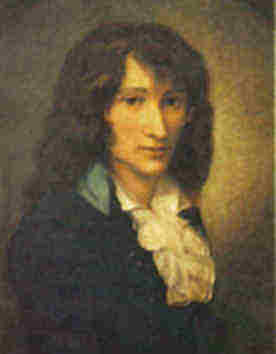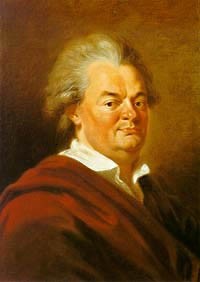|
Johann Gottfried Müthel
Johann Gottfried Müthel (January 17, 1728 – July 14, 1788) was a German composer and noted keyboard virtuoso. Along with C.P.E. Bach, he represented the Sturm und Drang style of composition. As far as is known, he was the first to use the term fortepiano in a published work, in the title of his ''Duetto für 2 Clavier, 2 Flügel, oder 2 Fortepiano'' (1771), which reflects the rising popularity of the instrument at that time. Biography He was born in Mölln in the Duchy of Lauenburg, the fifth of nine children. His father was Christian Caspar, an organist and friend of Georg Philipp Telemann. He studied music with his father, and later Johann Paul Kunzen in Lübeck. When only 19 years of age, he became a court organist and harpsichordist for Duke Christian Ludwig II of Mecklenburg-Schwerin, in Schwerin. In 1750 he was given leave to become the student of Bach in Leipzig. He became Bach's last pupil, beginning study only three months before the master's death. In that ... [...More Info...] [...Related Items...] OR: [Wikipedia] [Google] [Baidu] |
Potsdam
Potsdam () is the capital and largest city of the Germany, German States of Germany, state of Brandenburg. It is part of the Berlin/Brandenburg Metropolitan Region. Potsdam sits on the Havel, River Havel, a tributary of the Elbe, downstream of Berlin, and lies embedded in a hilly morainic landscape dotted with many lakes, around 20 of which are located within Potsdam's city limits. It lies some southwest of Berlin's city centre. The name of the city and of many of its boroughs are of Slavic languages, Slavic origin. Potsdam was a residence of the Prussian kings and the German Emperor until 1918. Its planning embodied ideas of the Age of Enlightenment: through a careful balance of architecture and landscape, Potsdam was intended as "a picturesque, pastoral dream" which would remind its residents of their relationship with nature and reason. The city, which is over 1,000 years old, is widely known for its palaces, its lakes, and its overall historical and cultural significance. ... [...More Info...] [...Related Items...] OR: [Wikipedia] [Google] [Baidu] |
German Male Classical Composers
German(s) may refer to: * Germany, the country of the Germans and German things **Germania (Roman era) * Germans, citizens of Germany, people of German ancestry, or native speakers of the German language ** For citizenship in Germany, see also German nationality law **Germanic peoples (Roman era) *German diaspora * German language * German cuisine, traditional foods of Germany People * German (given name) * German (surname) * Germán, a Spanish name Places * German (parish), Isle of Man * German, Albania, or Gërmej * German, Bulgaria * German, Iran * German, North Macedonia * German, New York, U.S. * Agios Germanos, Greece Other uses * German (mythology), a South Slavic mythological being * Germans (band), a Canadian rock band * German (song), "German" (song), a 2019 song by No Money Enterprise * ''The German'', a 2008 short film * "The Germans", an episode of ''Fawlty Towers'' * ''The German'', a nickname for Congolese rebel André Kisase Ngandu See also * Germanic ... [...More Info...] [...Related Items...] OR: [Wikipedia] [Google] [Baidu] |
People From Mölln, Schleswig-Holstein
The term "the people" refers to the public or common mass of people of a polity. As such it is a concept of human rights law, international law as well as constitutional law, particularly used for claims of popular sovereignty. In contrast, a people is any plurality of persons considered as a whole. Used in politics and law, the term "a people" refers to the collective or community of an ethnic group or nation. Concepts Legal Chapter One, Article One of the Charter of the United Nations states that "peoples" have the right to self-determination. Though the mere status as peoples and the right to self-determination, as for example in the case of Indigenous peoples (''peoples'', as in all groups of indigenous people, not merely all indigenous persons as in ''indigenous people''), does not automatically provide for independent sovereignty and therefore secession. Indeed, judge Ivor Jennings identified the inherent problems in the right of "peoples" to self-determination, as i ... [...More Info...] [...Related Items...] OR: [Wikipedia] [Google] [Baidu] |
1788 Deaths
Events January–March * January 1 – The first edition of ''The Times'', previously ''The Daily Universal Register'', is published in London. * January 2 – Georgia ratifies the United States Constitution, and becomes the fourth U.S. state under the new government. * January 9 – Connecticut ratifies the United States Constitution, and becomes the fifth U.S. state. * January 18 – The leading ship (armed tender HMS ''Supply'') in Captain Arthur Phillip's First Fleet arrives at Botany Bay, to colonise Australia. * January 22 – The Congress of the Confederation, effectively a caretaker government until the United States Constitution can be ratified by at least nine of the 13 states, elects Cyrus Griffin as its last president.''Harper's Encyclopaedia of United States History from 458 A. D. to 1909'', ed. by Benson John Lossing and, Woodrow Wilson (Harper & Brothers, 1910) p167 * January 24 – The La Perouse expedition in the ''Astrolabe'' and '' Boussole'' arri ... [...More Info...] [...Related Items...] OR: [Wikipedia] [Google] [Baidu] |
1728 Births
Events January–March * January 5 – The '' Real y Pontificia Universidad de San Gerónimo de la Habana'', the oldest university in Cuba, is founded in Havana. * January 9 – The coronation of Peter II as the Tsar of the Russian Empire takes place in Moscow. * January 29 – '' The Beggar's Opera'', the most popular theatrical production of the 18th century, is performed for the first time. The premiere takes place at the Lincoln's Inn Fields Theatre in London. Written by John Gay with music arranged by Johann Christoph Pepusch, the ballad opera is a satire of Italian opera. * February 28 – Battle of Palkhed: Maratha Peshwa Bajirao I defeats the first Nizam of Hyderabad, Nizam-ul-Mulk. * March 14 – Jean-Jacques Rousseau leaves Geneva for the first time. April–June * April 14 – Saint Serapion of Algiers, the first Mercedarian (of the Order of the Blessed Virgin Mary of Mercy) is canonized by Pope Benedict XIII. * ... [...More Info...] [...Related Items...] OR: [Wikipedia] [Google] [Baidu] |
Jeffrey Eugenides
Jeffrey Kent Eugenides (born March 8, 1960) is an American author. He has written numerous short stories and essays, as well as three novels: '' The Virgin Suicides'' (1993), ''Middlesex'' (2002), and '' The Marriage Plot'' (2011). ''The Virgin Suicides'' served as the basis of the 1999 film of the same name, while ''Middlesex'' received the 2003 Pulitzer Prize for Fiction in addition to being a finalist for the National Book Critics Circle Award, the International Dublin Literary Award, and France's Prix Médicis. Biography Jeffrey Kent Eugenides was born in Detroit on March 8, 1960. He is of Greek descent through his father and English and Irish descent through his mother. He has two older brothers. He attended Grosse Pointe's private University Liggett School and then Brown University (where he became friends with contemporary Rick Moody). He graduated from Brown in 1982 after taking a year off to travel across Europe, during which time he also volunteered with Mother Teresa ... [...More Info...] [...Related Items...] OR: [Wikipedia] [Google] [Baidu] |
Cantata
A cantata (; ; literally "sung", past participle feminine singular of the Italian language, Italian verb ''cantare'', "to sing") is a vocal music, vocal Musical composition, composition with an musical instrument, instrumental accompaniment, typically in several movement (music), movements, often involving a choir. The meaning of the term changed over time, from the simple single-voice Madrigal (music), madrigal of the early 17th century, to the multi-voice "cantata da camera" and the "cantata da chiesa" of the later part of that century, from the more substantial dramatic forms of the 18th century to the usually sacred-texted 19th-century cantata, which was effectively a type of short oratorio. Cantatas for use in the liturgy of church services are called church cantata or sacred cantatas; other cantatas can be indicated as secular cantatas. Several cantatas were, and still are, written for special occasions, such as Christmas cantatas. Christoph Graupner, Georg Philipp Teleman ... [...More Info...] [...Related Items...] OR: [Wikipedia] [Google] [Baidu] |
Clavichord
The clavichord is a stringed rectangular keyboard instrument that was used largely in the Late Middle Ages, through the Renaissance music, Renaissance, Baroque music, Baroque and Classical period (music), Classical eras. Historically, it was mostly used as a practice instrument and as an aid to composition, not being loud enough for larger performances. The clavichord produces sound by striking brass or iron strings with small metal blades called tangents. Vibrations are transmitted through the bridge(s) to the soundboard. Etymology The name is derived from the Latin word ''clavis'', meaning "key" (associated with more common ''clavus'', meaning "nail, rod, etc.") and ''chorda'' (from Greek χορδή) meaning "string, especially of a musical instrument". An analogous name is used in other European languages (It. ''clavicordio'', ''clavicordo''; Fr. ''clavicorde''; Germ. ''Klavichord''; Lat. ''clavicordium''; Port. ''clavicórdio''; Sp. ''clavicordio''). Many languages also have ... [...More Info...] [...Related Items...] OR: [Wikipedia] [Google] [Baidu] |
Christian Friedrich Daniel Schubart
Christian Friedrich Daniel Schubart (24 March 1739 – 10 October 1791) was a German poet, organist, composer, and journalist. He was repeatedly punished for his social-critical writing and spent ten years in severe conditions in jail. Life Born at Obersontheim in Swabia, he entered the University of Erlangen in 1758 as a student of theology. He led a dissolute life, and after two years' stay was summoned home by his parents. After attempting to earn a livelihood as private tutor and as assistant preacher, his musical talents gained him the appointment of organist in Geislingen an der Steige. Meeting Schubart in Ludwigsburg in 1772, Charles Burney called him "the first, real great harpsichord player that I had hitherto met with in Germany ... He is formed on the Bach school; but is an enthusiast, and original in genius. Many of his pieces are printed in Holland; they are full of taste and fire. He played on the Clavichord, with great delicacy and expression; his finger is brillia ... [...More Info...] [...Related Items...] OR: [Wikipedia] [Google] [Baidu] |
Charles Burney
Charles Burney (7 April 1726 – 12 April 1814) was an English music historian, composer and musician. He was the father of the writers Frances Burney and Sarah Burney, of the explorer James Burney, and of Charles Burney, a classicist and book donor to the British Museum. He was a close friend and supporter of Joseph Haydn and other composers. Early life and career Charles Burney was born at Raven Street, Shrewsbury, the fourth of six children of James Macburney (1678–1749), a musician, dancer and portrait painter, and his second wife Ann (''née'' Cooper, –1775). In childhood he and a brother Richard (1723–1792) were for unknown reasons sent to the care of a "Nurse Ball" at nearby Condover, where they lived until 1739. He began formal education at Shrewsbury School in 1737 and was later sent in 1739 to The King's School, Chester, where his father then lived and worked. His first music master was a Mr Baker, the cathedral organist, and a pupil of John Blow. ... [...More Info...] [...Related Items...] OR: [Wikipedia] [Google] [Baidu] |




